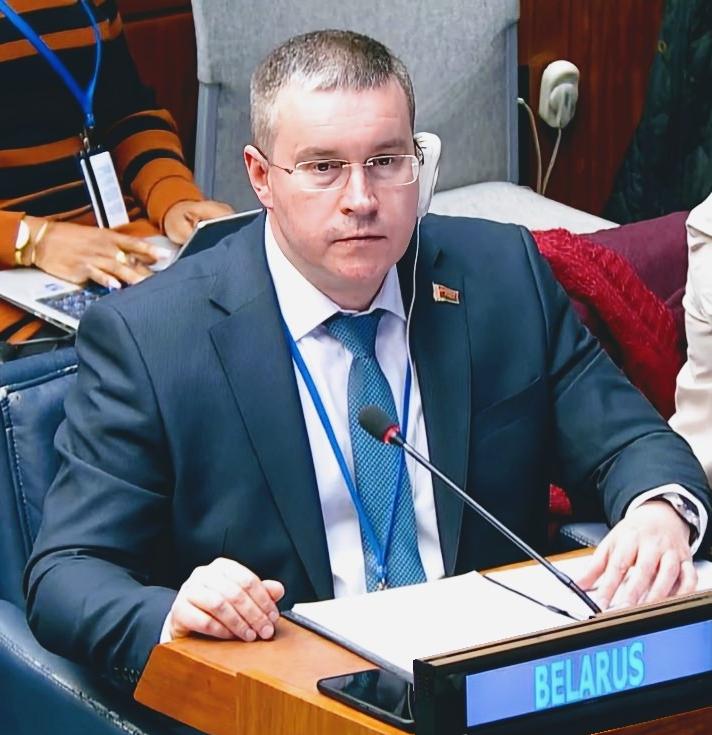
On March 4, 2025 in New York (United States of America) the 56th session of the United Nations Statistical Commission has started its work. The Belarusian side in the event is represented by Tsimafei Zhyharau, Deputy Chairperson of the National Statistical Committee of the Republic of Belarus.
1. During the session on the System of National Accounts (SNA), the SNA-2025 was adopted as an updated international statistical standard for the compilation of national accounts statistics and the strategy of its implementation was approved.
The Deputy Chairperson of Belstat noted that the updating of the SNA was done in such a way that all those interested would participate: “The National Statistical Committee has been actively involved in the process of global consultations on all proposed topics and new chapters of the SNA since 2021 and has expressed its position taking into account the conceptual changes in the SNA-2025”.
Tsimafei Zhyharau also emphasized that the parallel update of the SNA and the IMF's Balance of Payments and International Investment Position Manual will contribute to the maximum harmonization of macroeconomic statistics.
“Belstat expresses high readiness to implement the updated standard. In 2025 the stages of realization of the implementation of the new SNA in the Republic of Belarus will be included in the Strategy for the Development of State Statistics Until 2030”, - summarized the Deputy Chairperson.

2. The resolution on the 2030 World Population and Housing Census Programme and the fourth revised edition of the Principles and Recommendations for Population and Housing Censuses were endorsed under the consideration of the issue “Population and Housing Censuses”.
Belarus was the first country in the CIS region to conduct a digital census. Sharing the national experience, Tsimafei Zhyharau noted that the 2020 round census was the most innovative of all previously conducted ones: “Data collection was carried out by a combined method: using administrative data, conducting face-to-face surveys using tablet computers and through self-completion of questionnaires by respondents via the Internet. The use of GIS-technologies at the stage of preparation for the census allowed to obtain data that are geo-referenced and can be aggregated in any territorial section”.
The Deputy Chairperson also shared plans for the 2030 round census: “Belstat plans to considerably expand the use of administrative data, which will significantly reduce the burden on respondents. The legal basis for access to information resources of administrative data providers has already been formed and the Concept of the creation of the statistical register of the population has been prepared. Undoubtedly, the upcoming census will utilize the latest technologies, including artificial intelligence”.
3. During the session on Fundamental Principles of Official Statistics, Tsimafei Zhyharau emphasized that Belarus statistics is committed to international standards in the field of statistics.
“Statistical legislation of the Republic of Belarus is harmonized with the Model Law on Official Statistics developed by the UN Economic Commission for Europe and adopted as a standard for the countries of Eastern Europe, Caucasus and Central Asia. The principles of Belarusian statistics are in line with the Fundamental Principles of Official Statistics, which is confirmed by international experts.
In the updated Law of the Republic of Belarus on State Statistics the content of the basic principles of statistics is disclosed, the work with administrative data is systematized, the access of statisticians, including remote access, to all information systems and resources of government agencies and private data owners is fixed at the institutional level.
Today Belstat receives more than 600 sets of administrative data, which are used in all branches of statistics. More than 40% of indicators of the national list of SDGs are calculated on the basis of data from alternative sources.
This approach ensures resource savings, contributes to reducing the reporting burden on businesses and eliminates duplication of data requests in the country,” the Belstat representative explained in detail.
The session will continue its work until March 7, 2025.
© National Statistical Committee of the Republic of Belarus. When using information reference to the National Statistical Committee of the Republic of Belarus is mandatory.
